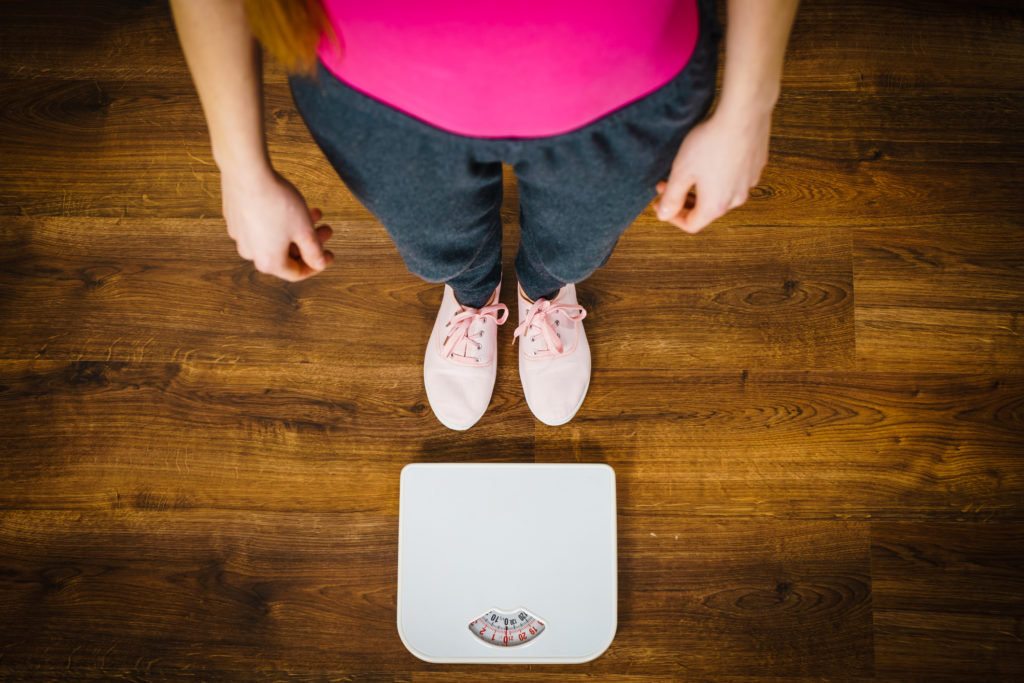NEW DATA SHOWS TEENS ARE DIETING
MORE THAN EVER BEFORE

Messages suggesting that teens need to change their physical appearance are everywhere – on social media, on television, in magazines and in movies. Those messages are often reinforced with comments from friends, family members, coaches, and even strangers. As a result, teens can develop distorted perceptions about body image, attitudes about food and physical activity, leading to increase in dieting in an attempt to lose weight.
In a recent report from the Center for Disease Control, almost 38% of teens ages 16 to 19 said they had tried to lose weight within the past year (McDow et al, 2019). This number is up almost 24% from previous years. Far more girls than boys reported trying to lose weight: around 45% compared to 30% of boys.
However, dieting during the teenage years is harmful and can have potential, negative long-term side effects. There is an increased risk of eating disorders, alcohol, and weight-related issues later in life (Yang et al, 2014). In addition, teens tend to use methods for weight loss that are not sustainable, effective or healthful, and can also lead to yo-yo dieting (Cena et al, 2017).
Help teens focus on health, not weight
Multiple factors influence weight including eating habits, physical activity, sleep, the ability to manage stress and screen time. Rather than encouraging teens to lose weight, focus on creating healthy habits so teens can have a healthy relationship with their food and their bodies.
Take a positive approach.
Weight bias and weight stigma are harmful, and can actually worsen health outcomes. Bodies come in all shapes and sizes. Rather than trying to manipulate or criticize body size or type, encourage teens to focus on finding ways to help have energy, feel good, and improve overall health rather than lose weight. Help teens find a healthy balance and learn new skills like meal planning, cooking or a new exercise class.
Make physical activity fun.
Encourage being active as a way to feel good, have more energy, learn a new skill, or spend time outside. The benefits of physical activity are endless and can contribute to improved mood, better grades, better sleep, and more confidence in teens. It’s also more helpful for health in the long run.
If your teen doesn’t enjoy sports or vigorous activity, try walking, biking, hiking, yoga or dance workouts, gym classes, rock climbing, or swimming. The opportunities for physical activity are endless! Working out should NOT be used to “burn off” food or be a punishment for eating. Exercise and eating should be utilized to support the body in a healthful way.
Avoid restriction.
Eating a variety of foods from all food groups will support teens in having a healthy relationship with food. When foods are restricted (like strict diets, rules like “no sugar”, low calorie intake, etc.), disordered eating can arise. Discuss eating healthful foods like fruits, vegetables, whole grains, and protein as a strategy for improving health and having more energy, rather than as a way to lose weight.
If your family is interested in making healthy lifestyle changes, the CPCMG W.E.L.L. Clinic can help. W.E.L.L. Clinic providers and health coaches are here to support your family in improving nutrition, physical activity, sleep, and emotional wellbeing habits. To schedule an appointment, please call 760-633-3640 or ask your pediatrician for more information about the W.E.L.L. Clinic.
References:
Cena, H., Stanford, F. C., Ochner, L., Fonte, M. L., Biino, G., Giuseppe, R. D., . . . Misra, M. (2017). Association of a history of childhood-onset obesity and dieting with eating disorders. Eating Disorders,25(3), 216-229. doi:10.1080/10640266.2017.1279905
Keel, P. K., Baxter, M. G., Heatherton, T. F., & Joiner, T. E. (2007). A 20-year longitudinal study of body weight, dieting, and eating disorder symptoms. Journal of Abnormal Psychology,116(2), 422-432. doi:10.1037/0021-843x.116.2.422
McDow KB, Nguyen DT, Herrick KA, Akinbami LJ. Attempts to lose weight among adolescents aged 16–19 in the United States, 2013–2016. NCHS Data Brief, no 340. Hyattsville, MD: National Center for Health Statistics. 2019.
Yang, K., Turk, M. T., Allison, V. L., James, K. A., & Chasens, E. (2014). Body Mass Index Self-Perception and Weight Management Behaviors During Late Adolescence. Journal of School Health,84(10), 654-660. doi:10.1111/josh.12195
Zarychta, K., Mullan, B., Kruk, M., & Luszczynska, A. (2017). A vicious cycle among cognitions and behaviors enhancing risk for eating disorders. BMC Psychiatry,17(1). doi:10.1186/s12888-017-1328-9

